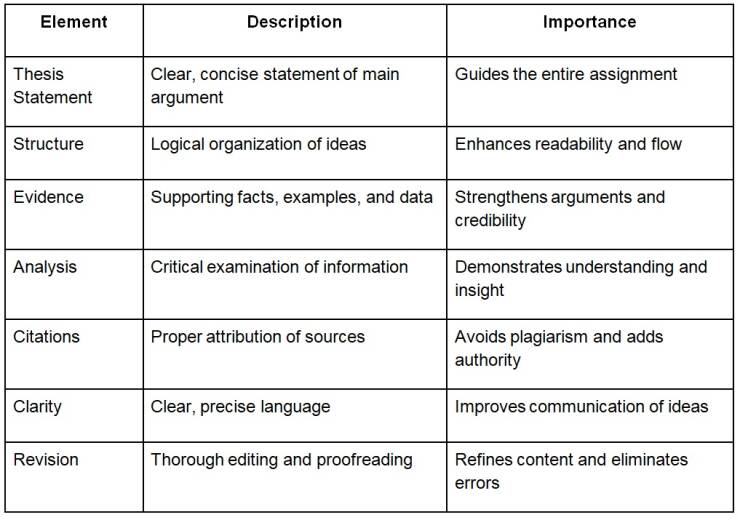Writing assignments are tough. Very tough. No matter what your field of study may be, writing is one of your most difficult assignments. Many students don’t write very well, and this is understandable considering the complex demands that academic writing places on writers today. If you really want to succeed – and by ‘succeed’ we mean, “write well and achieve a good grade” – then you should check out this guide and learn how to overcome your anxieties, master new writing techniques, and end up with an assignment that would make any academic proud. To improve your assignment writing, consider using assignment writing services that provide expert guidance and feedback, UKWritings.com is a reliable platform offering such services, helping students enhance their academic writing skills.
Understanding the Assignment
The number-one thing you can do – before you type a single word of your essay – is to be certain exactly what your assignment is. What is the topic? What does the instructor want you to say about that topic? What length of essay do you have to find for that topic? Should your essay be double-spaced or single-spaced? Does it need an abstract? Does it need to be turned in at the end of class, or on the following Tuesday? If any of these questions are fuzzy, ask your instructor to clarify. Spending a couple of minutes on this will be the most important thing you do to get off on the right foot.
Notice in particular any of the ‘criteria’ or ‘rubrics’ that the specific assignment instructions say you’re to use as you’re working; these will give you a clear idea of what you’re being asked to write to. Knowledge of the assignment’s goal and learning outcomes will also help you figure out what you’re being asked to do, and what to put in your paper.
Research and Preparation
Once you have a clear idea of what’s needed, you can begin researching and preparing. To collect the needed information, search academic journals, books and trustworthy websites. When you research, make note of the information you find, keeping it organized by subtopics or themes to facilitate writing later.
Draw up an outline that lays out the key points you wish to make in an assignment, as well as the supporting evidence and counterarguments. This will be particularly useful in helping you develop a logical progression in your writing and ensuring that you address all parts of a topic.
Developing Your Thesis Statement
The best assignments start with a solid thesis statement. Think of it as the spine of your assignment: it should tell your readers exactly what your main argument or position is, and what they can expect to read from you. Plan your thesis statement carefully, making sure that it is concise, specific, and definitely arguable. Enhancing your assignment writing can be achieved by getting feedback from reliable essay writing services, which can offer helpful insights to improve your work.
This is sometimes called your ‘thesis’, and it should be placed towards the end of your introduction, to help you arrive at the section of your assignment that will contain the body of the assignment. But don’t worry too much about this: as you develop your full assignment, your thesis might change.
Structuring Your Assignment
A clear structure helps your writing flow more easily to read and understand. First, start with an introduction that establishes background to the topic, outlines what the paper is about and introduces the thesis statement. The body of an assignment is broken into paragraphs, with each paragraph centered on one main idea and corresponding with a point in the thesis.
Pay attention to transition sentences – the two types highlighted in Chapter 1. Use transition sentences to help your reader understand how your paragraphs are connected and to keep several ideas flowing smoothly from one paragraph to the next. Your conclusion should summarize your main points, reaffirm your thesis after discussing your evidence, and offer a final thought or challenge to the reader.
Writing with Clarity and Precision
They help to ensure your readers can track your argument and really understand the point you’re making. Which means they need to know exactly what you are trying to say. So write plainly, in simple language that isn’t cluttered up with jargon or a lot of obscure words. Keep your sentences short and to the point.
Pay attention to word choice and sentence structure: you can keep your readers engaged by using a mix of long and short sentences, as well as varying sentence structures. As you become more comfortable with sentence construction, you’ll create more interesting and dynamic prose. Strive for an active voice whenever possible to make your writing more compelling.
Incorporating Evidence and Examples
Include relevant evidence and examples that support or exemplify your arguments and demonstrate your grasp of the subject. Examples could be illustrative statistics, quotations from experts, case studies or real-life examples that add strength to your points.
Be sure to cite any sources you use, and use citations that are consistent with the required style (APA, MLA, Chicago etc). Citation is important for attributing your sources, but also making your work look more professional and keeping you out of trouble with plagiarism.
Enhancing Critical Thinking
Academic writing relies on critical thinking. It involves questioning your assumptions. It involves considering other points of view. It involves evaluating the claims that others make in relation to your topic – and their strengths and weaknesses.
Let the text you’ve read influence your own thinking, but be capable of synthesizing it and presenting a reasoned argument. Don’t just paraphrase what you’ve read; add your own thoughts and interpretations based on the material you’ve been given.
Elements of Effective Assignment Writing
Revising and Editing
Revising your assignment writing is the next important step. If at all possible, let your first draft sit for a day before you begin refining it. Thanks to the break, your eyes will be refreshed and you’ll be less likely to get caught up in small errors that otherwise would be easy to miss.
The second round of revisions should focus on the overall structure and content: Are your paragraphs and arguments clear and logical? Are the connections between them smooth? Is there any opportunity to provide additional support for your thesis or evidence to back up your claims?
Once you are happy with your content and structure, then you move on to the editing stage which involves fine-tuning your language/grammar/punctuation. Read your work aloud – examine sentence structure and word choice, cultivate clarity in your language and recall.
Proofreading for Perfection
The final stage of bettering your assignment-writing skills is by proofreading your piece for any lingering errors in spelling, grammar, punctuation or layout. After all, proofreading is a great form of improvement, particularly if you do it in stages by looking at the layout one time, spelling another time, and grammar and punctuation yet another time.
Ask a classmate, friend or relative to read your assignment, too. Sometimes a new set of eyes can pick up on mistakes or places of confusion that you missed. And if your school offers writing center services, take advantage of those for additional feedback and support.
Seeking Feedback and Continuous Improvement
Students should seek feedback from their instructors and peers to further their ability to write at the level of good assignments. Take to heart what you are told, and seek improvement. Think about comments and suggestions made on your assignments and work to implement them in future assignments.
For example, you might keep a writing journal in which you reflect on the process of writing – what worked, what difficulties, and what strategies you’ve developed for mastering different research activities. Self-reflection can be a useful way to assess and improve your academic writing. It can help you reflect on strategies that have led to success or persistently challenged you. It can help you identify patterns of avoidance in your writing process. It can also help you monitor and measure your progress over time.
Time Management and Planning
Good time management is a critical element of adequate assignment writing. Work on assignments as soon as possible after they have been assigned, not at the last minute. Break your work down into smaller parts and set deadlines for those parts from getting started on research to outlining to writing to revision.
Writing allows for adequate time to complete each task, and remember your other obligations, too. There is potentially a way for you to conceive of a time-management system that could work. That way you won’t be up at 2am stressed and tired, writing a paper and submitting it without revised proofs.
Expanding Your Vocabulary and Reading
Writing for assignment can be aided by broadening one’s vocabulary and reading widely. Get yourself a new word every day and put it in context when you can. But don’t sacrifice clarity for complexity.
Read journals, books, articles in your field. Not only does this expand your knowledge but it also exposes you to more writing and academic conventions. Take note of how experienced writers structure their arguments, and how they provide information to their readers.
Embracing Technology and Tools
Utilize available technology and tools to help you improve. Word processing software often includes grammar and spell-check features that are useful for picking up relatively obvious errors. More sophisticated tools such as Grammarly, Hemingway Editor and the like offer further suggestions and recommendations to help you improve your writing style and clarity.
Tools such as Zotero or Mendeley are available to manage these sources, and to create citations in more or less the required style. Many institutions provide these tools for free, and investing time upfront to learn how to use them can save you time and effort, and mitigate errors in your bibliography or reference list.
Conclusion
One way to improve assignment writing is simply to keep doing it, being diligent and reflective, and continuing to adapt. If you can grasp what is being asked of you as far as assignment requirements go, undertake appropriate, detailed and reliable research, make an effective argument in support of your topic, pay attention to the structure and clarity of what you are writing, check it over and revise it carefully, ask someone else to provide feedback on that final draft, and keep doing other writing assignments with a view to becoming more confident and aware of your grammar, style and presentation as you go, you will be well on your way to producing far higher quality work than before. Gradually, your engagement with the subject will become more incisive and better written, which has to be a win-win situation in terms of your academic performance and your engagement with the course of study.





